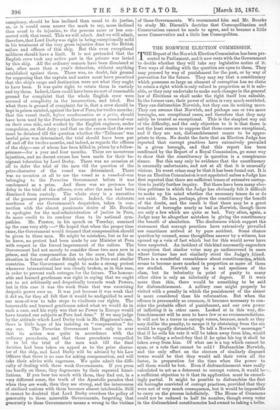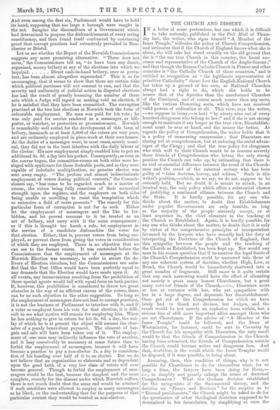THE NORWICH ELECTION COMMISSION.
THE Report of the Norwich Election Commission has been pre- sented to Parliament, and it now rests with the Government to decide whether they will take any legislative notice of it. Two ways of dealing with the question are open to them. They may proceed by way of punishment for the past, or by way of prevention for the future. They may say that a constituency which possesses so large an element of corruption has no claim to retain a right which is only valued in proportion as it is sale- able, or they may undertake to make such changes in the general law of Elections as shall make the right itself less saleable. In the former case, their power of action is very much restricted. They can disfranchise Norwich, but they can do nothing more. They can assume that Norwich, and perhaps one or two more boroughs, are exceptional cases, and therefore that they may safely be treated as exceptional. This is the simplest way out of the difficulty, and the only objection to it is that there is not the least reason to suppose that these cases are exceptional, and if they are not, disfranchisement ceases to be appro- priate to them. No doubt the facts that an Election Judge has reported that corrupt practices have extensively prevailed in a given borough, and that this report has been confirmed by the Report of a Royal Commission, go some way to show that the constituency in question is a conspicuous sinner. But this may only be evidence that the constituency is unusually unfortunate, and not at all that it is unusually vicious. Its worst crime may be that it has been found out. It is true an Election Commission is not appointed unless a Judge has first reported that there are sufficient traces of extensive corrup- tion to justify further inquiry. But there have been many elec- tion petitions in which the Judge has obviously felt it difficult to make up his mind whether the necessary traces do or do not exist. He has, perhaps, given the constituency the benefit of the doubt, and the result is that there may be a great number of boroughs nearly as bad as Norwich, though there are only a few which are quite as bad. Very often, again, a Judge may be altogether mistaken in giving the constituency the benefit of absolution. The disclosures which support the statement that corrupt practices have extensively prevailed are sometimes arrived at by pure accident. Some chance question by counsel, some thoughtless answer by a witness, has opened up a vein of fact which but for this would never have been suspected. An incident of this kind necessarily engenders a suspicion that similar veins may go undiscovered in cases where fortune has not similarly stood the Judge's friend. There is a wonderful resemblance about constituencies, which seems to become more marked in proportion as nacre; of them are studied. Norwich may be a sad specimen of the class, but its inferiority in point of purity to many
other cities is only an inferiority of degree. If it were more than this, there would be something to be said for disfranchisement. A solitary case might properly be visited with a penalty in which the punishment of the sinner is more considered than his reformation. But when the offence is presumably so common, it becomes necessary to con- sider the probable effect of punishment, and our own power of inflicting it in other cases. Looked at in this way, dis- franchisement will be seen to have few or no recommendations. It will not be a terror to corrupt voters, because, much as they may dislike the penalty, to escape it by abstaining from the sin would be equally distasteful. To tell a Norwich " messenger" that if he sells his vote it will be taken away from him, would be like telling a school-boy that if he spins his top it shall be taken away from him. Of what use is a top which cannot be spun, or a vote that cannot be sold I Disfranchise Norwich, and the only effect on the electors of similarly disposed towns would be that they would sell their votes all the faster, in preparation for the time when the power to sell them would be lost. Even if disfranchisement were really calculated to act as a deterrent to corrupt voters, it would be a sufficient objection to it that its application must be exceed- ingly partial. It might be possible to disfranchise the first six boroughs convicted of corrupt practices, provided that they were not of very much consequence, but it would be impossible to carry on the process indefinitely. The House of Commons could not be reduced to half its number, though every voter in the disfranchised constituencies had owned to taking a bribe. And even among the first six, Parliament would have to hold its hand, supposing that too large a borough were caught in the net. Imagine the discomfiture of a Government which had determined to propose the disfranchisement of every erring constituency, and then found itself confronted by convincing proof that corrupt practices had extensively prevailed in Man- chester or Bristol.
Let us see whether the Report of the Norwich Commissioners suggests any more promising alternative. " There does not seem," the Commissioners tell us, " to have been any direct, organised, money bribery at any of the elections into which we inquired. Direct cash-in-hand bribery, once so preva- lent, has been almost altogether superseded." This is so far encouraging, that it seems to show that there are certain risks which political partisans will not consent to run, and that the severity and uniformity of judicial action in disputed elections has had the result of greatly lessening the number of those acts which a Judge will regard as making void an election, if he is satisfied that they have been committed. The corruption practised at the two last elections at Norwich took the form' of colourable employment. No man was paid for his vote ; he was only paid for service rendered as a messenger, or bill- poster, or watcher, or protection or procession-man. Norwich is remarkably well suited for the development of this form of bribery, inasmuch as at least 3,000 of the voters are very poor, and are ordinarily employed in piece-work at their own homes. As the duties of a messenger were, in most cases, merely nomi- nal, they did not in the least interfere with the daily labour of the elector. His new employment simply enabled him to put an additional 3s. 6d. a day into his pocket. Consequently, as soon as the canvas began, the committee-rooms on both sides were be- sieged with applicants for these desirable posts, and as they were capable of indefinite multiplication, no genuine elector was sent away empty. " The profuse and almost indiscriminate employment of voters during political contests," the Commis- sioners say, "has come to be regarded much as a matter of course, the voters being fully conscious of their numerical strength upon the register, and the employers on both sides being unable or unwilling to resist the temptation which so extensive a field of votes presents." The remedy for this particular form of corruption is not far to seek. Either let the employment of messengers and the like be for- bidden, and let proved recourse to it be treated as an act of bribery, and carry with it the same consequences ; or if this is thought too harsh a rule, let employment in the service of a candidate disfranchise the voter for that election. Either, that is, prevent voters from being em- ployed, or prevent them from giving the votes in consideration of which they are employed. There is no objection that we can see to the former course. It was contended before the Commissioners that the employment of messengers at the Norwich Election was necessary, in order to secure the de- livery of Election circulars, but the Commissioners are satis- fied that the Post Office would have been perfectly equal to any demands that the Election would have made upon it. At all events, any inconvenience resulting from the prohibition of these special agents would fall with equal force on both parties. If, however, this prohibition is considered to throw too great obstacles in the way of an efficient canvas of the voters, there can be no such objection to the other suggestion. So long as the employment of messengers does not lead to corrupt practices, it is not the business of Parliament to interfere with it, and if a voter so employed loses his vote for that election, it is diffi- cult to see what motive will remain for employing him. When he has nothing to give in return for his 3s. 6d. a day, the out- lay of which he is at present the object will assume the char- acter of a purely benevolent payment. The element of bar- gain and sale will have been taken out of it. The employ- ment of one man may indirectly influence the vote of another, and it may conceivably be necessary at some future time to forbid the employment of messengers, because it will have become a practice to pay a non-elector 7s. a day in considera- tion of his handing over half of it to an elector. But we do not believe that an organisation so elaborate and so dependent upon the good faith of a very low class of voters will ever become general. Though to forbid the employment of mes- sengers would be the best, because the simplest and the most complete, remedy for the disease under which Norwich suffers, there is not much doubt that the same end would be attained if each candidate were allowed to employ as many messengers as he liked, on the understanding that for the purposes of that particular contest they would be treated as non-electors.



































 Previous page
Previous page